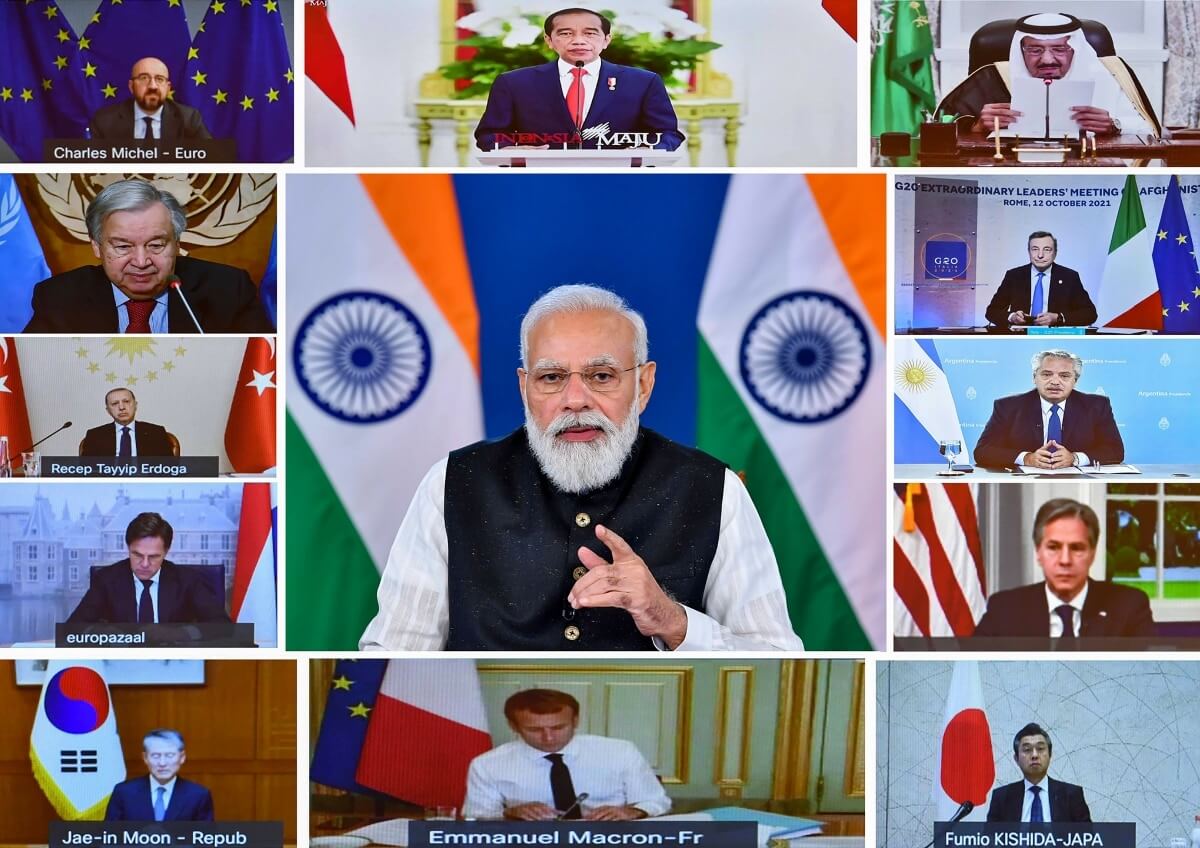On Tuesday, representatives of the G20 convened for the extraordinary leaders’ meeting on Afghanistan. The leaders concluded that involving the Taliban in the process of sending humanitarian aid would be inevitable. However, they clarified that this would not amount to political recognition of the group as the government of the country.
The meeting took place in a virtual format and was conducted under the rotating Italian Presidency. Several leaders, including Indian Prime Minister Narendra Modi and American President Joe Biden, participated in the discussions. However, Chinese President Xi Jinping and Russian President Vladimir Putin did not attend the meeting and sent representatives on their behalf.
The summit began with the European Union (EU) pledging to allocate $1.2 billion to help bring an end to the crisis in Afghanistan through humanitarian aid and by assisting countries take in Afghan refugees. The funds will not be given to the Taliban but to international organisations that are working on the ground. Following the meeting, German Chancellor Angela Merkel said, “To stand by and watch 40 million people plunge into chaos because electricity can’t be supplied and no financial system exists, that cannot and should not be the goal of the international community.”
According to the Chair’s Summary published following the meeting, the leaders agreed on the need to provide humanitarian aid to the war-torn country. They identified women, children, and those with disabilities as groups that are in urgent need of assistance. The release said that this was critical in order to prevent a “humanitarian catastrophe,” which could result in an “uncontrolled migrant flow” from Afghanistan to neighbouring countries and beyond. They posited that failure to help the country and its people could result in a surge in terrorist activities across the globe.
Member states voiced their support for the support United Nations’ “advocacy role” and also agreed to cooperate with international financial institutions, including the World Bank, International Monetary Fund, and other multilateral development banks to deliver humanitarian aid to Afghanistan. They also called for a rapid vaccination drive that can prospectively administer the entire population with the jabs donated through the COVAX initiative.
Nevertheless, the leaders clarified that humanitarian aid will be provided “in accordance with internationally agreed humanitarian principles on the basis of independent needs assessments.” The aid from the G20 will largely be provided through the United Nations. However, some assistance will be directly given from the countries to Afghanistan.
Furthermore, the statement urged the Taliban to focus on ensuring that radical militant groups, like Al Qaeda and ISIS, do not use Afghanistan as a breeding ground for terrorist activities. Lastly, they clarified that the humanitarian aid being provided by the international community must be directed towards protecting the rights of women and ensuring the safe passage of those who wish to leave the country.
Following the meeting, Italian Prime Minister Mario Draghi said, “There has basically been a convergence of views on the need to address the humanitarian emergency.” He also celebrated the meeting as “the first multilateral response” to the ongoing crisis in Afghanistan. Speaking about the controversial decision to involve the Taliban in the process, he said, “It’s very hard to see how one can help the Afghan people … without some sort of involvement of the Taliban government.” Further, he added that because there has been no progress on the human rights front seen since the Taliban took control, it is essential to urgently move in and help protect the rights of the people, specifically the women.
Many Afghan citizens remain stranded in the country despite their efforts to flee. Since the Taliban took control over the country, several observers have reported shortages in food and other essential goods and services. This is attributed to the withdrawal of aid and the freezing of Afghan assets in overseas banks.
In this context, while the Taliban continues to struggle to gain recognition as the legitimate government of the country, the situation is likely to improve with the G20 agreeing to resume international aid.
G20 Summit on Afghanistan: All You Need to Know
The G20 extraordinary leaders’ meeting is the first multilateral response to the ongoing humanitarian crisis in Afghanistan.
October 13, 2021

SOURCE: INDIA TODAY
